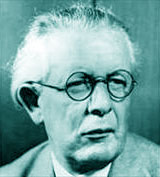Who Was Jean Piaget?
 |
A driving force behind psychology's improved understanding of the child's brain, Jean Piaget was a biologist-turned psychologist whose works are still remembered today - even 3 decades after his death. An insightful thinker, the developmental theories of Piaget Jean have revolutionised the structure of the curriculum and how young people are taught at specific ages of their youth. We have some background knowledge on one of the world's greatest thinkers to work with, and so we can now look further at his achievements and ideas more closely. |
The foundation of the studies conducted by Piaget Jean came from looking at and examining student behaviour at different points during one's schooling experience. He was however, forced to carry out these observations for a number of years on a range of willing participants before he reached the breakthrough that accelerated his career.
Piaget discovered that as a child goes through the process of maturity, significant changes to the workings of their brain and mind occur. He cited this as the stimulus in allowing young people to consolidate and understand new information on a wide range of subjects and individual topics.
The underlying meaning of this observation is that there are some things that children simply cannot learn until they grow older. Some accepted this idea as a potential truth, whereas others reacted more disapprovingly - largely because they held a passionate belief that any form of knowledge can be obtained if enough effort and attention is devoted to it.
His assumption was based upon the character adjustments that take place over a number of years. For example, he believed humans were born with no conscious knowledge, only the subconscious awareness of the need to breathe, sleep, etc. He stated that as children mature, they become increasingly aware of what is going on around them, before developing a logical foundation upon which decisions and actions are decided. It is this intelligence that enables them to learn things that they couldn't even comprehend beforehand.
He went on to note that the ages at which considerable changes in a child's mindset and thinking pattern happened were 18 months, 7 years, and 11 years. Respectively, these steps landmark the points in a lifetime where conscious actions, a change from egocentrism to caring and understanding about other's opinions, and the development of logic occur.
According to Piaget Jean, by the end of this process - age 11 or 12 - most students become concerned about what they want to do with their future. In the past, they may have thought only about the 'here and now'. After this point, though, the past attitude dissolves, and it is this amendment that marks a new search for purpose during adult life.
The developmental theories put forward by Jean Piaget received a great reception, and are commonly applied in modern classrooms and educational institutions to this day. Admittedly, some of his ideas were - and still are - subject to questioning, with groups in society implying that the age boundaries Jean set disregarded slow or fast developers. Either way, his assumptions and theories have definitely transformed the views of modern pedagogy researchers in a way that seems likely to stick around for quite some time.